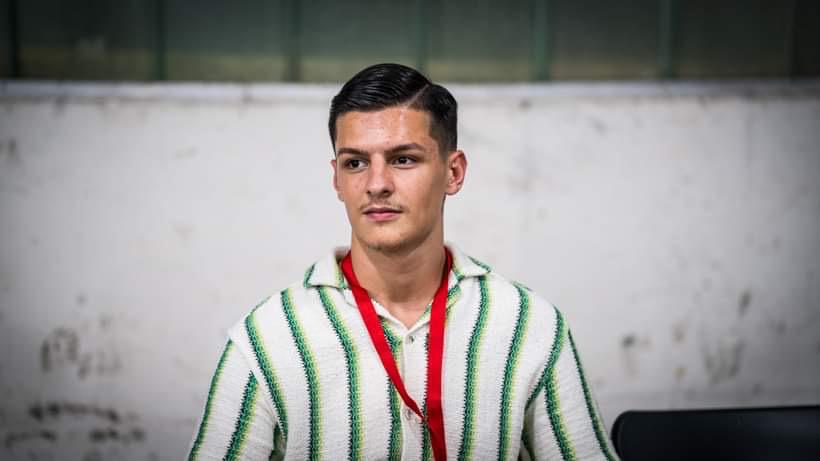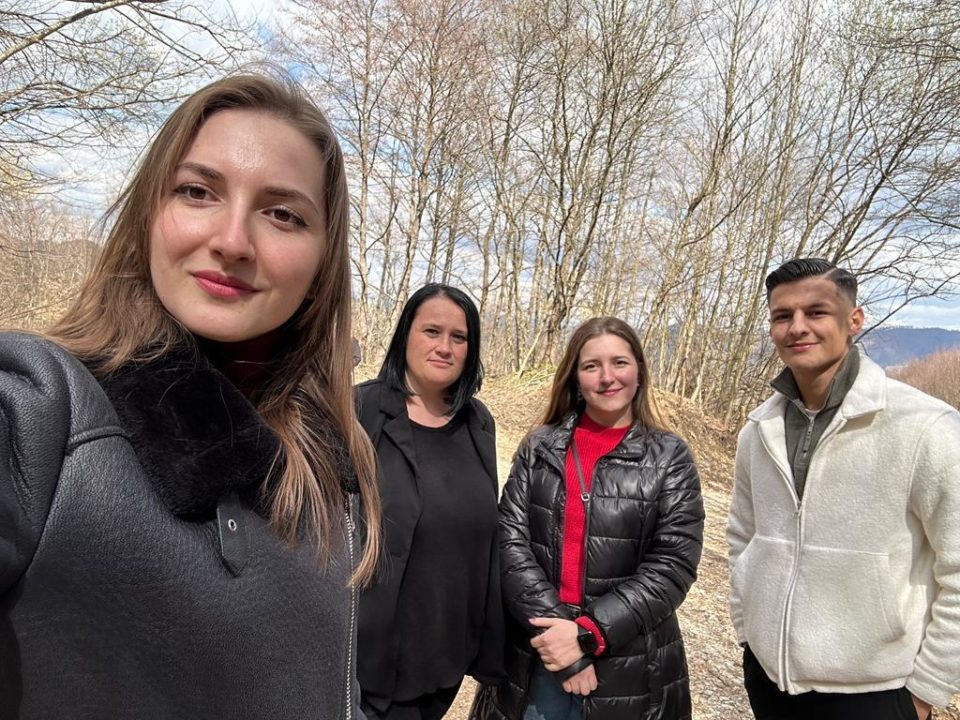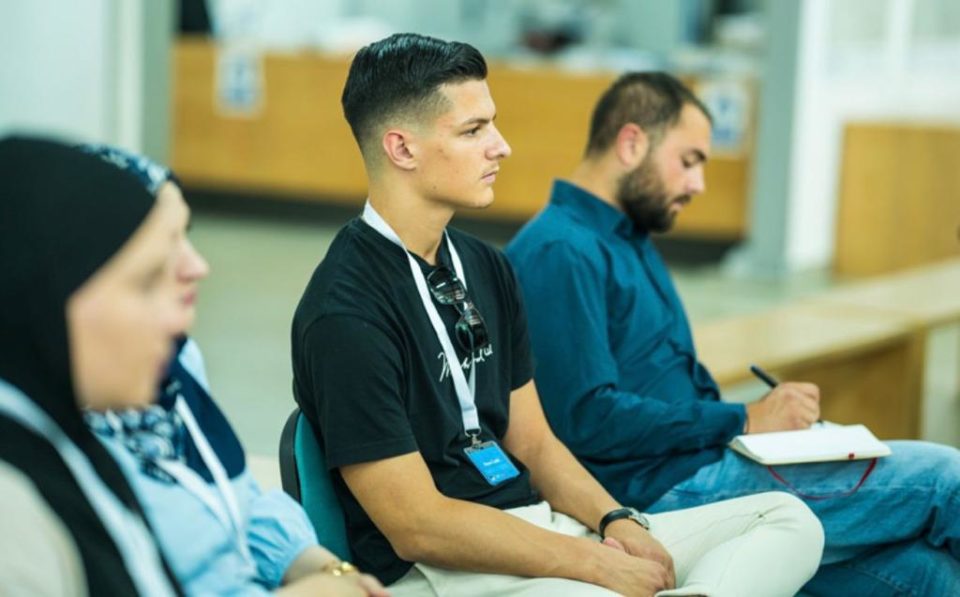
Imagine you sit in front of a world map and get to pick any place in the world. That’s where you will go and live for a year. Harun Čandić sat at home one day and looked at that map showing the 60 countries where he could go volunteer for a year, including such places New York, Cape Town, and even New Zealand. However, with the world at his fingertips, he chose the Srebrenica Memorial Center.
Instead of living in an exotic place or working for a large institution, he committed himself to learning about the Bosnian genocide—the genocide from which his own family had fled.
A Neglected Subject in Austrian Schools
Čandić grew up in Austria, a place familiar to many families from the former Yugoslavia. During the 1960s, the country concluded labor agreements with Yugoslavia and Turkey to help with economic and infrastructural reconstruction. As a result, many Yugoslav citizens, often referred to as “Gastarbeiter” or guest workers, came to Austria to work in various industries, including construction, manufacturing, and agriculture.

This arrangement lasted for several decades and had a significant impact on the economies and societies of both countries. Later, during the 1990s, Austria was among the nations that offered asylum and assistance to those fleeing the war in former Yugoslavia.
Yet, even though in some Austrian classrooms students whose parents are from the former Yugoslavia comprise a majority, the breakup and the wars which followed find almost no mention in the school curriculum.
Learning More with the Srebrenica Memorial Center
Čandić himself was fairly well-informed about the Srebrenica genocide and had even attended the July 11th commemoration. However, when he heard about the opportunity to go and work with the Memorial Center, he saw a unique chance to broaden his knowledge.
He and hundreds of others were able to volunteer abroad thanks to the Austrian Service Abroad. The organization was founded in 1992 with the goal of sending young Austrians to different Holocaust memorials as an alternative to mandatory military service. In this way, not only would they represent their country, but they would develop an understanding of Austria’s role and responsibility in the Second World War.
Initially, this idea was met with criticism, as prominent politicians and academics at that time still claimed Austria was the “first victim” in the War, and therefore couldn’t have played any malign role in Hitler’s Germany. Today, however, the organization is internationally recognized, funded by the Austrian Ministry of Social Affairs, and has even expanded its scope to the genocides in Rwanda and Bosnia and Herzegovina.
When the then 18-year-old Čandić applied to the Austrian organization, his motivation was clear from the start. “I believe that divisions based on ethnic, racial, national, and religious grounds should belong to the past. And yet, we live in a world where hatred is increasingly prevalent,” he says. “I would love for as many people as possible to be involved in creating a better future for all of us—otherwise, we return to the darkness of hatred and divisions”.
Part of his initial motivation was also to join the fight against genocide denial. “History is the teacher of the future,” he contends, “and so we should learn from it.” Nevertheless, despite the many living witnesses and international verdicts, there are still policies and individuals today who deny genocide.
Special Focus on Oral History
As a volunteer, the young Austro-Bosnian dedicated himself to the Oral History project. The team behind this project is led by Hasan Hasanović, who survived the genocide by escaping through the woods in July 1995. Over the past few years, they have managed to interview more than 400 survivors and produce two exhibitions.
However, this kind of work also exacts a heavy mental toll. “You sit and listen to the most traumatic stories, it’s difficult to handle, and then you imagine how it must have been for the person who experienced it,” Čandić reflects. “It’s really hard to put those kinds of emotions into words, but sadness, pain, and helplessness are probably the most apt.”

He will never forget the story of Zlatija Mujanović, who survived the mass killing of her closest family members. In her village of Glumini, where 36 people were killed, she was wounded in both the arm and the leg while trying to save one person during her escape.
For the young volunteer, she is an inspiration.
“It’s an incredible act of selflessness to try to save someone under those circumstances. She also enlisted and fought in the army,” he recalls with admiration. “Unfortunately, today, she lives in very difficult conditions and continues to struggle for her life,” he continues, referring to the hardship faced by Bosniak returnees in the Republika Srpska (RS) entity.
For Čandić, the most fulfilling job was working as a translator. In this capacity, being multilingual – speaking German, Bosnian, and English – proved useful. “Helping people from abroad better understand what happened in 1995 and expanding their knowledge about the crimes committed in Bosnia and Herzegovina is what I find most fulfilling,” he adds.
“The Truth is Sometimes Bitter but Undoubtedly Healing”
Even though the young Čandić never experienced war, he has felt the atmosphere of the frozen conflict that grips Bosnia and Herzegovina and the wider region.
In his view, the hostile political climate accompanied by historical revisionism “sows the seeds for future conflicts.” Advocating for the truth is his solution for the never-ending question of reconciliation. “Even though it can sometimes taste bitter, it’s undoubtedly healing for everyone.”
Now back in Vienna, he wants to appeal to his generation – the youth. “They say the future belongs to the young, so it’s our responsibility to work towards a better future for all of us. Let’s be builders, not those who destroy what has been painstakingly built over the years.”






